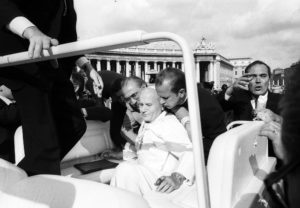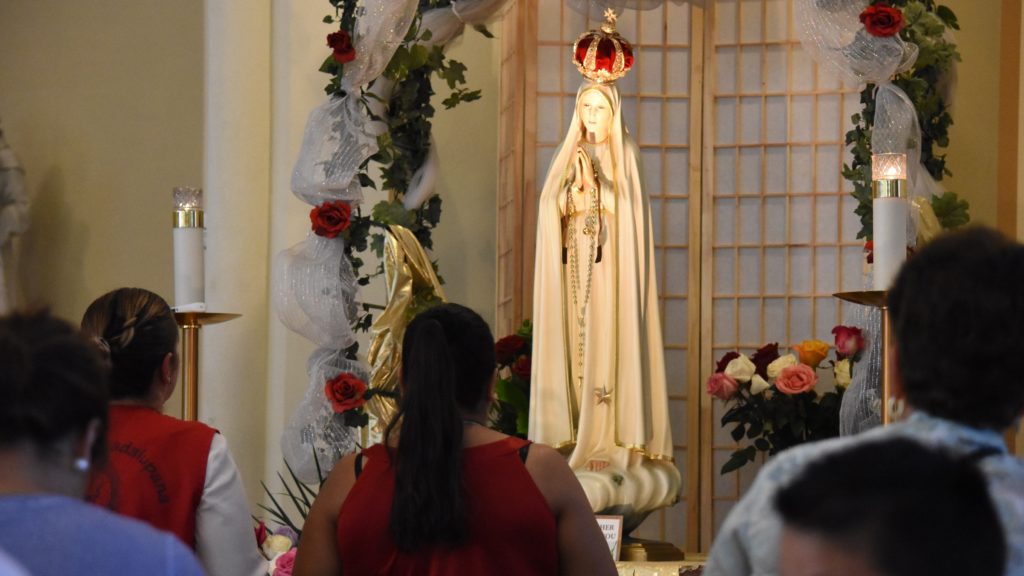It was the feast of the Assumption, August 2018, and I cried as we were prompted to sing “Immaculate Mary.” It was the beginning of the third verse that got me. “We pray for the Church, our true Mother on earth.”
That summer, Theodore McCarrick was on the road to laicization for his blasphemies and abuses while the Pennsylvania grand jury report was all over the news. The Church was hard to picture as a mother.
I had “all the feelings,” as the kids say. I confessed some anger in confession, a sacrament that truly does work miracles in the heart. And as I got over myself, I smiled realizing the obvious message of my whole messy exercise: being the mother of God, Mary is also the mother of us all, the way to the much-needed “revolution of tenderness” that Pope Francis talks about. No one of us is going to lead it on our own. That’s why at his weakest hour, Jesus gave us his mother to be ours, too.
The Church can’t be a mother without Mary (or without women, for that matter). And there would be a lot less loneliness in the world if everyone knew her as a mother and a model of love in the world.
In the face of every suffering, not only do I think of the image of the Pietà, with Mary holding the body of her crucified Son — Our Lord — in her arms, but also holding you and me in his place. To call her the Sorrowful Mother is not just a pious saying, but recognizes her solidarity with everyone in any kind of pain.
That pain is everywhere today. I’ve been thinking a lot lately about the influences that threaten to steal the innocence of children today, and the brokenness in families that makes the idea of unconditional love unthinkable.
That’s where the month of Mary comes in. Near the mid-way point of May, we celebrate Our Lady of Fátima, a feast day that calls to mind the struggle between good and evil underway in our world. It was on this day, May 13, 1981, that St. Pope John Paul II was shot in St. Peter’s Square.
Four bullets were shot, and two completely missed. The Holy Father believed that Mary had stopped them.

While recovering, he became convinced that the messages Our Lady delivered to the three shepherd children in Fátima, Portugal, were more important then than when they were revealed in 1917.
Father Andrew Apostoli, CFR, who helped found the Franciscan Friars of the Renewal alongside Father Benedict Groeschel, wrote in 2010 that John Paul was convinced that the struggle of our modern world was “between the forces of good and evil, between a living faith in the Supreme Being and the absolute rejection of God.”
“He recognized the consequences of this struggle: there will either be a civilization of love and truth based on the sanctity of human life and those rights and responsibilities given by the Creator to each human person, or a tyranny of hate and oppression based on contempt of God, hatred of his Church and relativistic values” (“Fatima for Today: The Urgent Marian Message of Hope,” Ignatius Press, $18.69).
Our Lady of Fátima’s warning of a war worse than the one happening at the time, the First World War, came true two decades later with World War II and the Holocaust.
There is, of course, a war within, and we will lack peace until we use the tools of our faith to combat it.
At Fátima, Mary said quite clearly: “Do not offend the Lord our God any more, because he is already so much offended!” She was talking about our sins.
We can sit around and bemoan the evil we see in the headlines, but she wants us to know we have a power, and this is the time to wield it. It’s what St. Paul writes: “Do not be overcome by evil but overcome evil with good” (Romans 12:21).
When Pope Benedict went to Fátima in May 2012, he said that Our Lady’s message “is not directed to particular devotions, but precisely to the fundamental response, that is to ongoing conversion, penance, prayer, and the three theological virtues: faith, hope, and charity.”
At Fátima, Mary told us to pray the rosary. Reflecting on the mysteries, we can’t but help to become closer to Jesus, which is what Mary always does for us.

The one Fátima child who lived to adulthood, Lucia, became a religious sister and wrote to the pope about one of the insights she got in prayer about the messages. According to a cardinal who has seen the letter, she wrote: “The final battle between the Lord and the kingdom of Satan will be about marriage and family . . . nevertheless, Our Lady has already crushed his head.”
That seems both a warning and a promise. We must take Mary’s motherhood seriously so that we will take all motherhood seriously.
Every day since the Supreme Court overturned Roe v. Wade, abortion has been in the news. There are countless women and men who have been hurt by abortion and continue to be. The political and judicial fights about abortion pills are a brutal reminder that girls and women are having abortions alone in their bathrooms.
If we ever needed the love and guidance of the perfect mother, it’s now.
To live Fátima, we have to acknowledge that all that ails us is bigger than us. It is to live knowing we have a Savior in Jesus Christ who gave us his mother at the foot of the cross.
But that was not the end of the story. We get Mary in Easter joy and the outpouring of the Holy Spirit at Pentecost.
Be ready for a renewed outpouring of the Holy Spirit if you reunite or get acquainted with Mary as your mother — whatever your vocation. She will help us — mothers and children, neighbors and strangers, the Church and the culture. She will help us. We just have to let her.
And let’s pray in a particular way for those young people who are passing through Fátima to be with Pope Francis at World Youth Day in Lisbon, Portugal, this summer. I can’t help but think — and pray — that the intercession of John Paul and Benedict will be at work to help make it all the more powerful.
May each young person spiritually bring along with them in their hearts a contemporary who needs Mary, Jesus, and Joseph. May they know the most perfect mother — the only one — who will bring them to God himself for everything that they need, most of which they don’t even realize. None of us do. Not until we see the face of the Father.

